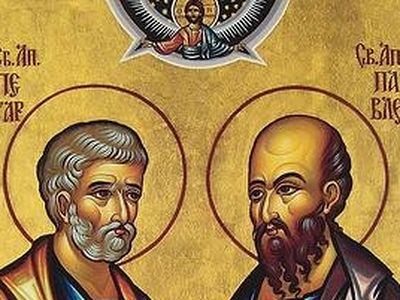First Homily on the Lenten Season
Contained within the collection of homilies of St. Augustine of Hippo on the liturgical seasons is a series of seven “appropriately solemn” homilies offered at the beginning of the Lenten season in various years. In this series St. Augustine touches upon the classic Lenten themes of fasting, prayers, and almsgiving which enable us as Christians to enter upon the battle against the passions and for the virtues, such as humility and patience, which represent for us the taking up of our own crosses, and which we learn supremely from the Crucified Lord Himself. We offer here one of these sermons each day for the first week of Great Lent:
With the completion of the year’s cycle, the season of Lent has come, at which time I am constrained to exhort you because you owe the Lord works in harmony with the spirit of the season, works which, nevertheless, are useful not to the Lord, but to you. True, other seasons of the year ought to glow for the Christian by reason of his prayers, fasts, and almsdeeds, but this season ought to arouse even those who are sluggish at other times. In fact, those who are quick to attend to these works at other times should now perform them with even greater diligence. Life in this world is certainly the time of our humiliation as these days signify when the sufferings of the Lord Christ, who once suffered by dying for us, are renewed each year with the recurrence of this holy season. For what was done once and for all time so that our life might be renewed, is solemnized each year so that its memory may be kept fresh. If, therefore, we ought to be humble of heart with sentiments of most sincere piety throughout the entire period of our earthly sojourn when we live in the midst of temptations, how much more necessary is humility during these days when we not only pass the time of our humiliation by living but signalize it by special devotion? The humility of Christ has taught us to be humble because He yielded to the wicked by His death; the exaltation of Christ lifts us up because by rising again He blazed the way for His devoted followers. For, if we have died with him, we shall also live with him; if we endure, we shall also reign with him.[1] One of these conditions we now celebrate with due observance in view of His approaching Passion; the other we shall celebrate after Easter when His Resurrection is, as it were, accomplished again. Then, after the days of this humiliation will be the time of our exaltation. Although this is not yet the time to experience this [happiness], it gives us pleasure to anticipate it in our considerations. Now, therefore, let us voice our lamentations more insistently in prayers; then we shall exult more exuberantly in praise.
Let us by our prayers add the wings of piety to our almsdeeds and fasting so that they may fly more readily to God. Moreover, the Christian soul understands how far removed he should be from theft of another’s goods when he realizes that failure to share his surplus with the needy is like to theft. The Lord says: Give, and it shall be given to you; forgive, and you shall be forgiven.[2] Let us graciously and fervently perform these two types of almsgiving, that is, giving and forgiving, for we, in turn, pray the Lord to give us good things and not to requite our evil deeds. Give, and it shall be given to you, He says. What is truer, what is more just, than that he who refuses to give should cheat himself and not receive? If a farmer is not justified in seeking a harvest when he knows he has sowed no seed, how much more unreasonably does he who has refused to hear the petition of a poor man seek a generous response from God? For, in the person of the poor, He who experiences no hunger wished Himself to be fed. Therefore, let us not spurn our God who is needy in His poor, so that we in our need may be filled in Him who is rich. We have the needy, and we ourselves have need; let us give, therefore, so that we may receive. In truth, what is it that we give? And in return for that pittance which is meagre, visible, temporal, and earthly, what do we desire to receive? What the eye has not seen nor ear heard, nor has it entered into the heart of man.[3] Without the assurance of God it would have been effrontery to wish to gain such treasures in return for such paltry trifles, and it is effrontery to refuse to give to our needy neighbor these things which we would never have possessed except from the bounty of Him who urges us to give. With what confidence do we hope to see Him giving to our neighbor and to us, if we despise His commands in the least details? Forgive, and you shall be forgiven, that is, pardon and you shall be pardoned. Let servant be reconciled to fellow servant lest he be justly punished by the Lord. In this kind of almsgiving no one is poor. Even he who has no means of livelihood in this world may do this to insure his living for eternity. Gratuitously this alm is given; by being given away it is increased; and it is not consumed except when it is not shared. Therefore, let those enmities which have lasted even to this day be broken up and ended. Let them be ended lest they end you; let them be no longer held lest they hold you; let them be destroyed by the Redeemer lest they destroy you, the retainer.
Let not your fasting be of the kind condemned by the Prophet when he said: Not this fast have I chosen, saith the Lord.[4] For He denounces the fasts of quarrellers; He seeks those of the devout. He denounces those who oppress and seeks those who release. He denounces those who stir up hostilities and seeks those who set free. For, during these days, you restrain your desires from lawful pursuits that you may not do what is unlawful. At no time will he be addicted to wine or adultery who is now continent in marriage. Thus, by humility and charity, by fasting and almsgiving, by temperance and forgiveness, by sharing blessings and by not retaliating for evils, by declining from wickedness and by doing good, our prayer seeks and attains peace.[5] For prayer, supported as it were, on the wings of virtues, speeds upwards and is easily borne into heaven whither Christ, our peace, has preceded.
From The Fathers of the Church vol. 38: St. Augustine: Sermons on the Liturgical Seasons, (New York: Fathers of the Church, Inc.), 1959, pp. 86-89






